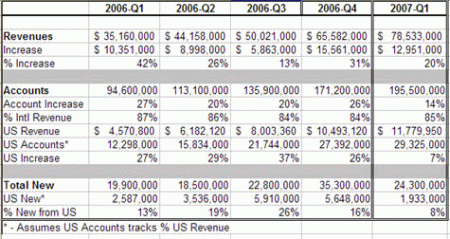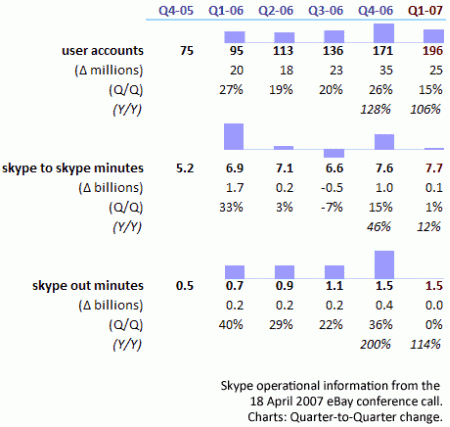Skype starts to slow down
It seems that the revolutionary plans of Skype are not destined to come true. The number of users of this program is no longer growing as rapidly as before. Such conclusions can be made if we analyze the statistics published by eBay. Please note that the table does not indicate “users”, but “accounts”. It is clear that the number of accounts can be several times larger than the number of active users. The ARPU indicator is practically not growing and is only 40 cents.

The most alarming moment in all statistics is the almost complete stoppage of the influx of new subscribers from the USA.
Despite the fact that the total number of users has increased by as much as 24 million people, the number of paid Skype Out minutes has remained the same as in Q4. 2006, namely 1.5 billion

As you can see, even the number of free minutes within the network has remained virtually unchanged (7.7 billion).
These are clear signs that the booming phase of Skype is coming to an end. There can be many reasons for this. Dozens of similar services based on open protocols have appeared on the Internet, providing better quality at a lower price (for example, GTalk and Gizmo Project). Not to mention the powerful competition from commercial telecoms who hastily roll out their own VoIP services.
Well, another reason for the slowdown in Skype’s growth is the inability to master the mobile platform, without which promising development is simply impossible.
via Skype Journal

The most alarming moment in all statistics is the almost complete stoppage of the influx of new subscribers from the USA.
Despite the fact that the total number of users has increased by as much as 24 million people, the number of paid Skype Out minutes has remained the same as in Q4. 2006, namely 1.5 billion

As you can see, even the number of free minutes within the network has remained virtually unchanged (7.7 billion).
These are clear signs that the booming phase of Skype is coming to an end. There can be many reasons for this. Dozens of similar services based on open protocols have appeared on the Internet, providing better quality at a lower price (for example, GTalk and Gizmo Project). Not to mention the powerful competition from commercial telecoms who hastily roll out their own VoIP services.
Well, another reason for the slowdown in Skype’s growth is the inability to master the mobile platform, without which promising development is simply impossible.
via Skype Journal
